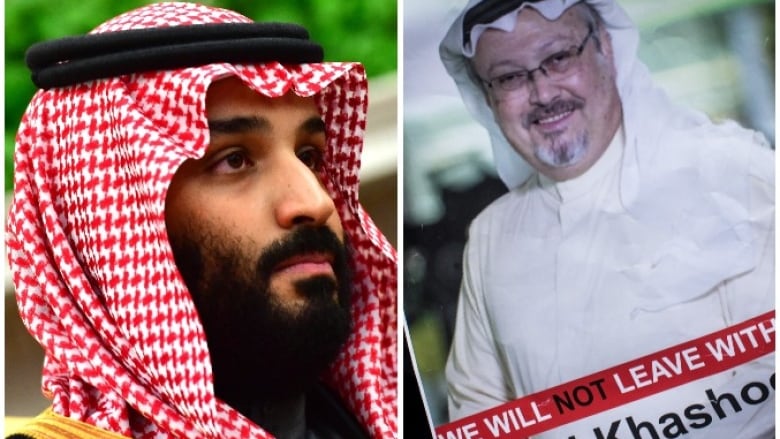
Saudi Arabia’s crown prince and de facto ruler, Mohammad Bin Salman, approved an operation “to capture or kill” Washington Post columnist Jamal Khashoggi, according to a newly declassified U.S. intelligence report released Friday.
U.S. intelligence officials came to that conclusion based on several factors, including the direct involvement of a top Bin Salman adviser in Khashoggi’s murder and “the crown prince’s support for using violent measures to silence dissidents abroad,” the report states.
The White House on Friday cleared the release of a long-delayed intelligence report that determined that Saudi Crown Prince Mohammed bin Salman, the country’s day-to-day leader, ordered the operation that led to journalist Jamal Khashoggi’s death in 2018.
Following the release, the U.S. Treasury and State departments slapped sanctions and travel bans on a number of Saudi security officials. But none of the penalties will hit Prince Mohammed directly, nor has the U.S. threatened broader measures such as trade restrictions or a lessening of support in Saudi Arabia’s proxy conflict with Iran. A senior administration official said the U.S. is eager to avoid a rupture of relations, but
“Since 2017, the crown prince has had absolute control of the Kingdom’s security and intelligence organizations, making it highly unlikely that Saudi officials would have carried out an operation of this nature without the crown prince’s authorization,” says the four-page document released by the Office of National Intelligence.
Lawmakers said the long-anticipated report demands a forceful U.S. response – including possible penalties for the crown prince, who is known by his initials as MBS.
“The highest levels of the Saudi government, including Crown Prince Mohammed bin Salman, are culpable in the murder of journalist and American resident Jamal Khashoggi,” said Rep. Adam Schiff, D-Calif., the chairman of the House Intelligence Committee.
The report contained few details of Prince Mohammed’s alleged role, and its bottom-line conclusion was long known, analysts said the public censure of the prince, and by extension the Saudi state, was extraordinary.
“The Biden Administration will need to follow this attribution of responsibility with serious repercussions against all of the responsible parties it has identified, and also reassess our relationship with Saudi Arabia,” Schiff said.
Riyadh rejected the U.S. intelligence report, which was written during Mr. Trump’s tenure and released by the Office of the Director of National Intelligence. Saudi Arabia said it “completely rejects the negative, false and unacceptable assessment” in the four-page document. “The report contained inaccurate information and conclusions,” the foreign ministry said in a statement.
The Saudi statement added that the kingdom rejects “any measure that infringes upon its leadership, sovereignty, and the independence of its judiciary system.” But it affirmed Saudi Arabia’s “robust and enduring partnership” with the U.S.
Early timeline :
Khashoggi, a U.S. resident who had been critical of the Saudi ruling family, was killed inside a Saudi consulate in Istanbul on Oct. 2, 2018.
The crown prince has denied he ordered Khashoggi’s killing. Saudi officials have acknowledged that operatives from the kingdom carried out the killing, but they’ve portrayed it as a rogue operation gone awry.
In 2019, a court in Saudi Arabia sentenced five people to death for Khashoggi’s slaying/, but it placed no blame on the royal family. Critics have called the Saudi proceedings a “mockery” and a whitewash.
The DNI report notes that the 15-member Saudi team which arrived in Istanbul on Oct. 2, 2018 included officials who worked for or were associated with a wing of the Saudi Royal Court.
Intelligence officials also note that MBS viewed Khashoggi as a threat to the kingdom and supported silencing him.
“Although Saudi officials had pre-planned an unspecified operation against Khashoggi, we do not know how far in advance Saudi officials decided to harm him,” the report states.
The Trump administration had refused to release the unclassified report on Khashoggi’s murder, even though it was mandated by Congress. Former President Donald Trump and his son-in-law, Jared Kushner, cultivated close ties with the royal family, and with Bin Salman in particular.
In 2019, a top United Nations expert on extrajudicial executions similarly found “credible evidence” that high-level officials in Saudi Arabia – including MBS – were involved in Khashoggi’s death.
The U.N. investigation, led by special rapporteur Agnes Callamard, provided new details, including snippets of conversation between Khashoggi and his Saudi killers. Callamard urged the U.S. government to open an FBI investigation into Khashoggi’s slaying and pursue criminal prosecutions in the U.S. for those responsible, among other steps.
With inputs from BBC
